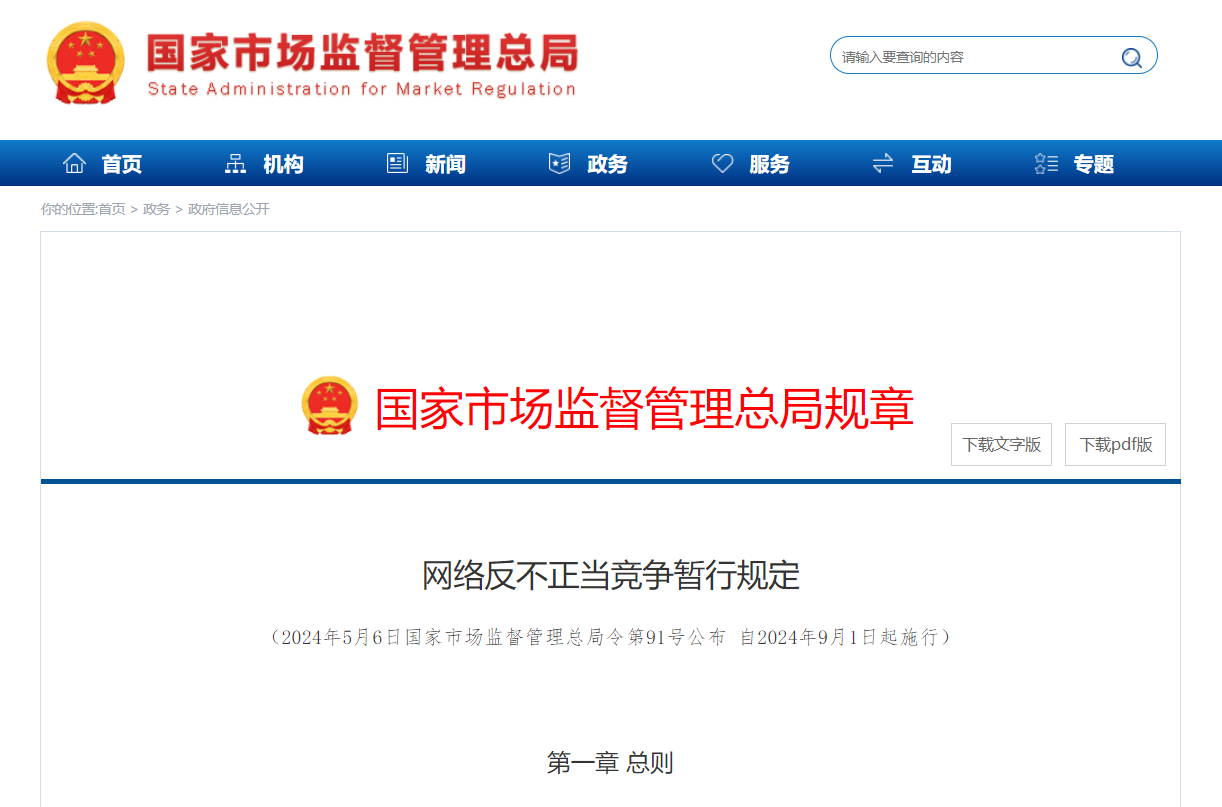
Recently, the State Administration for Market Regulation of China announced the "Provisions on Combating Unfair Competition in Cyberspace (Interim)," which will take effect from September 1, 2024. These provisions aim to prevent and halt unfair competition behaviors in cyberspace, maintain a fair market order, encourage innovation, protect the legitimate rights and interests of operators and consumers, and promote the sustained and healthy development of the digital economy.

The provisions target various unfair competition practices in the online market such as fake reviews, order brushing, e-commerce exclusivity, counterfeiting, false advertising, etc., and propose explicit prohibitions and regulatory measures.
Addressing the issues of fake reviews and order brushing, Article 9 of the provisions explicitly prohibits operators from engaging in activities like false transactions, fabricated transaction amounts, fabricated user reviews, fabricated traffic data, etc., to ensure consumers can access genuine and accurate product information.
Regarding counterfeiting and confusion tactics, Article 7 of the provisions prohibits operators from engaging in confusion behaviors, including unauthorized use of others' influential logos, domain names, page designs, etc., as well as producing and selling products that could easily be mistaken for those of others.
False advertising is also a focal point for crackdown. Article 8 of the provisions mandates that operators refrain from engaging in false or misleading commercial propaganda through websites, clients, live broadcasts, platform recommendations, etc., to avoid misleading consumers.
Addressing the issue of "e-commerce platform exclusivity," the provisions provide clear regulations. Article 24 stipulates that platform operators must not utilize means such as service agreements, transaction rules, etc., to impose unreasonable restrictions or attach unreasonable conditions on operators within the platform, including but not limited to forcing the signing of exclusive agreements, imposing unreasonable restrictions on product prices and sales conditions, etc.
The State Administration for Market Regulation has stated that the "Provisions on Combating Unfair Competition in Cyberspace (Interim)" are formulated based on laws and regulations such as the Anti-Unfair Competition Law and the E-commerce Law.
Dingxiang: Providing Professional Anti-Fraud Solutions
Fake reviews and order brushing have long been persistent issues in the e-commerce industry, forming an entire industry chain. Attackers possess numerous accounts, continuously update professional tools, and employ new tactics, making it challenging to identify and prevent risks due to their complex origins. A misjudgment by platforms can directly impact user experience.
To effectively address these challenges, Dingxiang offers a comprehensive anti-fraud solution that employs dynamic strategies and deep protection. It not only identifies and prevents various types of fraudulent activities but also ensures that normal user experiences remain unaffected.
1. Identification and Early Warning of Risky IP Addresses:
By integrating with an IP risk database, Dingxiang matches abnormal and suspicious accounts with risky IPs. By identifying risks such as proxies and rapid IP changes, the system intercepts malicious IP addresses, thereby preventing fraud at its source.
- Recognition and Early Warning of Risky Devices: Through Dingxiang Device Fingerprinting, the system conducts in-depth analysis of account device information. It identifies risky behaviors such as injection, hooking, and emulation, as well as suspicious patterns like multiple activations on the same device or abnormal IP associations. By generating unified and unique device fingerprints through cross-device information, Dingxiang tracks and identifies fraudulent activities, effectively warning against risky devices.
- Identification and Interception of Risky Accounts: Based on behavioral and device analysis, Dingxiang strategically deploys controls against suspicious accounts involved in order brushing and fake reviews. By leveraging Dingxiang atbCAPTCHA combined with AIGC technology, it effectively intercepts malicious accounts and abnormal operations without compromising user experience. This process not only enhances the convenience and efficiency of user login services but also significantly strengthens real-time countermeasures.
4. Analysis and Prediction of Future Risk Behaviors:
Establishing a dynamic operation and maintenance mechanism for local whitelists, Dingxiang maintains blacklisted data corresponding to order brushing and fake reviews by accumulating registration, login, and activation data. As online data accumulates, Dingxiang utilizes risk control and business data to model user behavior. The model outputs can be directly applied to risk control strategies, further enhancing the foresight and precision of risk prevention.
Dingxiang Dinsight, combined with the Xintell intelligent modeling platform, provides enterprises with a powerful tool for risk assessment, anti-fraud analysis, and real-time monitoring. Dinsight processes data in less than 100 milliseconds, supporting configurable access and accumulation of data from multiple sources. Leveraging deep learning technology, Dinsight achieves self-performance monitoring and iterative mechanisms for risk control. The Xintell platform optimizes security policies for known risks, uncovers potential risks, and provides end-to-end modeling services, from data processing to model deployment, comprehensively enhancing risk control efficiency and accuracy.
Through dynamic strategies and deep protection, Dingxiang not only effectively identifies and prevents fraudulent activities such as order brushing and fake reviews but also provides solid security assurance for the healthy development of the digital economy while protecting user privacy and enhancing user experience.


